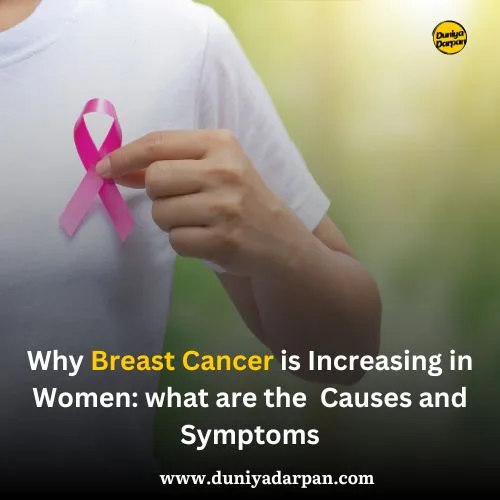Why Breast Cancer is increasing in Women : Causes, symptoms and Treatment
Breast cancer is a type of cancer that develops in the cells of breast tissue. It is one of the most common cancers among women but can also occur in men. In 2020, approximately 2.3 million women were diagnosed with this cancer, making it the second-most common cancer in women. Awareness of the symptoms, causes, and treatment options is crucial for early detection and effective management.
Recently, Actress Hina Khan faces stage 3 breast cancer with courage. In a recent social media post, she prayed for the strength to overcome her health challenges.
Causes of Breast Cancer
- Age: The risk of developing this cancer increases with age, particularly after the age of 50. About 8 out of 10 cases occur in women over 50.
- Family History: Individuals with close relatives who have had breast or ovarian cancer are at a higher risk. Gene mutations in BRCA1 and BRCA2 significantly increase the likelihood of developing this cancer.
- Previous History or Lump: Those previously diagnosed with this cancer or non-invasive cancer cell changes in breast ducts are at a higher risk.
- Dense Breast Tissue: Women with dense breast tissue, which contains more glandular tissue, are at an increased risk.
- Hormones and Hormonal Medicines: Hormone replacement therapy (HRT) and certain contraceptive pills may contribute to the development of this cancer.
What are the Symptoms of Breast Cancer
- Changes in the size or shape of one or both breasts
- Nipple discharge, possibly with blood
- Presence of a lump or swelling in the breast
- Skin dimpling on the breast
- Rash around the nipple
- Changes in the appearance of the nipple
Treatment Options for Breast Cancer
Treatment can vary based on the stage and type of cancer, as well as individual patient factors. Common treatments include:
- Surgery: Removal of the tumor or the entire breast (mastectomy).
- Radiation Therapy: Targeted radiation to destroy cancer cells.
- Chemotherapy: Use of drugs to kill cancer cells, often used when cancer has spread.
- Hormonal Therapy: Medications that block hormones that fuel certain cancers.
- Targeted Therapy: Drugs that target specific characteristics of cancer cells, such as HER2 protein.
If any symptoms or risk factors are observed, seeking immediate medical attention is crucial for early detection and treatment.
As we need to continue to raise awareness and advocate for better access to healthcare services, let’s empower ourselves and others to prioritize breast health. Together, we can make a difference in early detection, treatment outcomes, and ultimately, in the fight against cancer.
Stay informed, stay proactive, and take charge of your breast health—it could save your life.
Breast Cancer FAQs
Janiye Breast Cancer ke baare mein sabse zyada puchhe gaye sawaalon ke jawaab – Simple, clear aur trusted information ke saath!
1. Breast Cancer kya hota hai?
Yeh ek aisa cancer hai jo breast ke cells mein develop hota hai. Yeh zyadatar women ko hota hai, lekin men bhi isse affected ho sakte hain (rare cases mein).
2. Iske main symptoms kya hote hain?
- Breast mein ganth ya lump
- Nipple se discharge (blood ya pus)
- Nipple ka shape badalna ya andar chale jaana
- Skin mein redness ya dimpling
- Breast ka size ya shape change hona
3. Breast Cancer kaise detect hota hai?
Doctors use karte hain:
- Mammogram (X-ray of breast)
- Ultrasound
- MRI scan
- Biopsy – jisme tissue ka test hota hai
4. Breast Cancer ka risk kis age mein zyada hota hai?
Mostly 40 ke baad risk badhta hai, lekin aajkal 30s mein bhi cases aa rahe hain. Isliye early screening is must.
5. Kya men ko bhi Breast Cancer hota hai?
Haan, lekin ye rare hai. Around 1 in 1000 cases men mein hota hai.
6. Iska treatment kya hota hai?
Treatment depend karta hai stage par. Options:
- Surgery (lumpectomy ya mastectomy)
- Chemotherapy
- Radiation therapy
- Hormonal aur targeted therapy
7. Kya yeh disease genetic hoti hai?
Haan. Agar aapke family mein kisi ko yeh Cancer hua hai, toh BRCA1 ya BRCA2 gene mutation ki possibility ho sakti hai. Genetic test helpful hota hai.
8. Breastfeeding ka kya role hai?
Research ke according, breastfeeding breast cancer ka risk reduce karta hai – especially agar 6 months ya zyada breastfeed kiya ho.
9. Breast Cancer kaise prevent kar sakte hain?
Healthy weight maintain karein
Smoking aur alcohol avoid karein
Regular exercise karein
Monthly self-breast exam karein
40 ke baad regular mammogram zaroor karaayein
10. Kya Breast Cancer ka cure possible hai?
YES – Agar early stage mein detect ho jaye toh chances of successful treatment high hote hain. 5-year survival rate early stages mein over 90% hai.
Follow us on Social media

